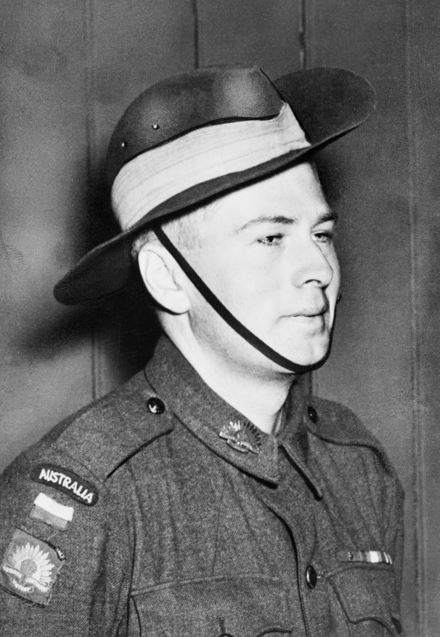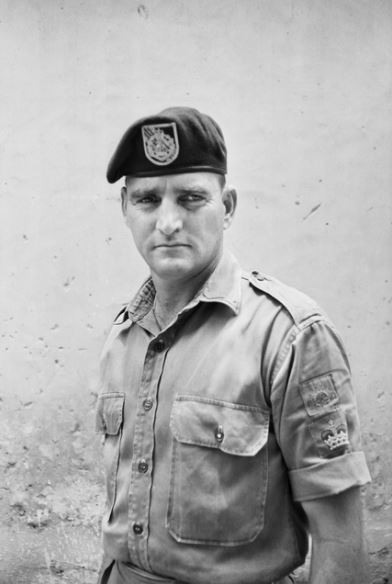Private Frank John Partridge VC (1924 - 1964, 39yo)
 Frank John Partridge was born on 29 November 1924 in Grafton, New South Wales, and raised on his family’s farm. He left school at thirteen to work the land, a life he would temporarily set aside during the Second World War. Initially serving in the Volunteer Defence Corps, Partridge was later mobilised for active duty with the Australian Military Forces and posted to the 8th Battalion—a militia unit that deployed to Lae, New Guinea, in May 1944.
Frank John Partridge was born on 29 November 1924 in Grafton, New South Wales, and raised on his family’s farm. He left school at thirteen to work the land, a life he would temporarily set aside during the Second World War. Initially serving in the Volunteer Defence Corps, Partridge was later mobilised for active duty with the Australian Military Forces and posted to the 8th Battalion—a militia unit that deployed to Lae, New Guinea, in May 1944.
On 24 July 1944, Partridge took part in a patrol tasked with neutralising an enemy position near Ratsua, codenamed Base 5. As the group came under intense machine-gun fire, Partridge, despite suffering wounds to his arm and thigh, launched a fearless assault on a Japanese bunker. Using grenades and a knife, he killed its occupants before moving toward a second position, halting only when blood loss rendered him unable to continue. His extraordinary bravery earned him the Victoria Cross—making him the youngest Australian to receive the award during the Second World War, and the last to do so before the war’s end.
Following his discharge on 17 October 1946, Partridge returned to farming life. In the early 1960s, he became a national figure once more when he appeared on the popular television quiz show Pick a Box, achieving the rare feat of winning all forty boxes.
Partridge remained active in his community and among veteran circles. He held honorary membership in the Returned Sailors’, Soldiers’ and Airmen’s Imperial League of Australia, served as patron of the Macksville Ex-Servicemen's Club, and was vice-president of the Nambucca district council of the Banana Growers' Federation Co-operative.
Tragically, Frank Partridge was killed in a car accident near Bellingen on 23 March 1964. He was laid to rest with full military honours in Macksville Cemetery.
Warrant Officer Class 2 Keith Payne VC (1933-)

Keith Payne was born on 30 August 1933 in the northern Queensland town of Ingham. After finishing school, he began work as an apprentice cabinet maker while also serving part-time in the Citizens Military Forces with the 31st Infantry Battalion. His military career formally began in August 1951 when he enlisted in the Australian Regular Army.
His early postings included 2nd Battalion, Royal Australian Regiment (2 RAR) in 1951 and 1 RAR in mid-1952. That same year he deployed to Japan as an infantry reinforcement before being sent to Korea in September. Payne served with Australian forces until March 1953, later joining the 28th British Commonwealth Brigade and remaining in Korea until August that year.
Throughout the 1960s, Payne held a series of demanding postings. He served with 3 RAR in Malaysia from 1963 and was promoted to Sergeant. During operations along the Malay-Thai border in 1964, he sustained minor injuries but continued serving until the unit returned to Australia in 1965. He then briefly joined 5 RAR before becoming an instructor at the Officer Training Unit in New South Wales. In early 1967, Payne transferred to Papua New Guinea to join the 2nd Pacific Islands Regiment. He rose to Warrant Officer Class 2 during this tour, which ended in 1968.
In February 1969, Payne joined the Australian Army Training Team Vietnam. In May, while commanding the 212th Company of the 1st Mobile Strike Force Battalion, his unit was heavily engaged by a North Vietnamese force. Despite being wounded in both hands and arms and with his troops under severe pressure, Payne covered their withdrawal, established a defensive perimeter, and spent hours under fire searching for and evacuating around 40 wounded soldiers. For this extraordinary act of courage and leadership, he was awarded the Victoria Cross.
Medically evacuated to Australia in September 1969, Payne recovered in Brisbane and was later appointed as an instructor at the Royal Military College, Duntroon. In addition to the Victoria Cross, he received the Distinguished Service Cross and Silver Star from the United States, and the Republic of Vietnam’s Cross of Gallantry with Bronze Star. He retired from the Australian Army in 1975.
Following his military retirement, Payne accepted a commission as a Captain with the Armed Forces of the Sultan of Oman and served during the Dhofar War. Upon returning to Australia, he became a strong advocate for veterans, especially in supporting those living with post-traumatic stress disorder.
Last Reviewed 06/2025









